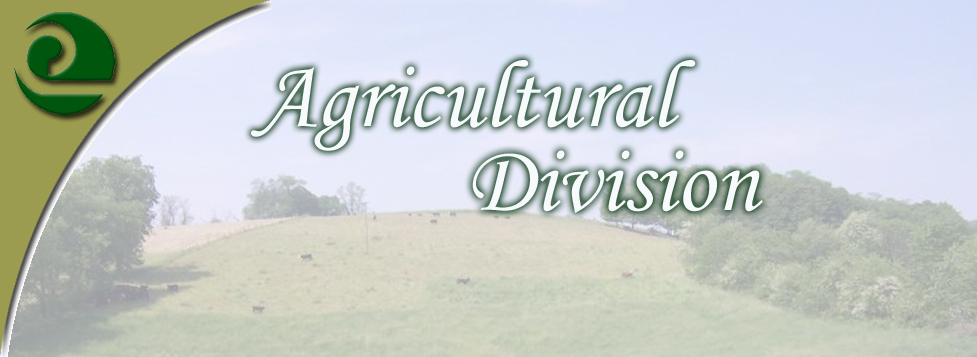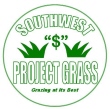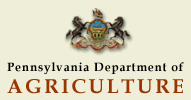
 |
        Links  NRCS Soil Quality Publications (printable)     Agronomy Fact Sheets |
Washington County Conservation District Agricultural Office The District office is located in the same building as the USDA agricultural offices. This
provides a one stop shopping center for the farmers of Washington
County and enables our employees to work closely with the USDA agencies.
Washington County, according to the USDA National Agricultural Statistics Service, is ranked 3rd in the state for dry hay, 4th in alfalfa hay, and 4th in all types of forage. Our county is also ranked 1st in total sheep and lambs, 3rd in the total number of farms, and 2nd in the total number of beef, sheep, and goat farms. We rank 1st in total number of llama farms and 3rd in total number of mules, burros, and donkeys. In addition, we have a tremendous horse industry, both pleasure and professional, with Washington County ranking 4th in the state for number of horses. The District has obtained Growing Greener and 319 Grants for the Cross Creek, Raccoon Creek, and Buffalo Creek Watersheds in the time the Ag Division has been in existence. In addition, the Partners for Wildlife Program at California University of Pennsylvania has been very successful in obtaining Growing Greener grants and grants from various other sources for riparian stream corridor restoration in several watersheds in our county including Pike Run, Pigeon Creek, Ten Mile, Cross Creek, and Buffalo Creek Watersheds. Together this partnership of the USDA, Partners for Wildlife, and the Conservation District are installing stream bank fencing and restoring more miles of riparian corridor than any other county in Pennsylvania. Manure Management Regulations in PA In October of 2011 The PA DEP published new guidelines for manure
management in Pennsylvania. Any operation that generates or applies manure no
matter how small is now required to have and follow a written manure management
plan. The plan does not need to be approved, but a copy of it must be available
on the farm. Large scale farming operations defined as CAO’s (concentrated
animal operations) or CAFO’S (Concentrated animal feeding operations) are
required to have a more detailed plan that is written by a certified Nutrient
Management Specialist, and approved by the local Conservation District.
Assistance is available at the Conservation District to help you determine if
your farm falls into either of those categories. The DEP has released a Manure Management Manual that can be completed by farmers at no cost. The manure Management Manual and workbook can be found on the PA nutrient management website which is available through the Manure Management Plan Guidance link on the right side of our page. Hard copies are also available at the Conservation District Office. If you have any questions about the workbook please feel free to contact us, we will be more than happy to help you complete your plan. No-Till Seeder: The District's No-Till Seeder program has been a very successful program since we purchased our first seeder in 1993. In 2006 the District replaced the previous seeder with a new Hay Buster seeder, which is able to seed a ten foot width and has rear mounted support wheels. The program pays for itself while providing an important service to the agricultural community. During 2009 the seeder was used on 473 acres of farmland by 21 farmers in Washington and Greene Counties. This was a decrease in total acres but an increase in the number of farmers using the drill. We believe that rising fuel costs have encouraged more farmers to use the no-till seeder more in recent years. This is evident in the increase in the number of farmers that are utilizing the program. This is a good thing when you consider that by using no-till you save on fuel and greatly reduce erosion of your valuable crop land. If you are interested in borrowing the seeder, please read the guidelines, then call 724-705-7098. Additional copies of forms can be found in the column to the right. Project Grass: The Conservation District supports and promotes the use of roatational grazing systems. Technical assistance is provided by the NRCS, our Ag Office and the Project Grass Coordinator for the region, J.B. Harrold. Our Agricultural Administrator, John Hewitt, serves as Secretary/Treasurer of the Southwest Project Grass chapter committee. Click the Southwest Project Grass link to the left for more information. In 2009 a project consisting of two pressurized watering systems was installed using funding from a Project Grass Growing Greener Grant. The Conservation District and the Southwest Project Grass Chapter co-hosted the 2007 Statewide Project Grass Conference in October of 2007 at the Meadowlands Holiday Inn. The two worked closely with the Penn's Corner RC&D Council to ensure a quality conference. Approximately 150 people attended this two day event which was held in conjuncture with the 2007 Annual Meeting of the North American Chapter of the Devon Cattle Association and included farm visits to two area farms. There were farmers in attendence from as far away as Texas and Maine, and the conference was an extremely successful event. Nutrient Management Program: In addition to the Nutrient Management funding provided by the PA Department of Agriculture for conservation districts, the PDA also made funding available in 1999 for the hiring of Agriculture Conservation Technicians. The purpose of these technicians was to augment the services provided by the USDA. We continue to employ a Nutrient Management Specialist, John Hewitt, to provide service to Washington County. In 2009, four nutrient management plans were reviewed and approved, and one plan was revised. The total number of farm acres in Washington County (as of December 2009) planned under NMA is 7,901 Conservation Stewardship Program: The Conservation Stewardship Program (CSP) is a working lands conservation program administered by the Natural Resources Conservation Service (NRCS) and available on a nationwide basis. CSP offers technical and financial assistance to farmers for maintaining high standards of environmental stewardship. Assistance is available for both the active management of existing conservation systems and for implementing new conservation activities on land in agricultural production. Please follow the links below for more information: Environmental Quality Incentives Program: EQIP is a voluntary conservation program that helps farmers and owners of agricultural land, including forest landowners, reduce pollution and improve natural resources. EQIP provides technical and financial assistance to help people plan, install and implement structural, vegetative and management conservation practices on agricultural land and forest land. Financial assistance is provided through practice payments based on average costs to implement conservation practices. Payment rates are listed on the annual Practice Payment Rate Schedule. Limited resource Farmers, Beginning Farmers and Ranchers, and Socially Disadvantaged Farmers are eligible for higher payment rates. EQIP contracts can be as short as one year with a one year maintenance period. Most contracts are for work that can be completed within four years. Total financial assistance payments are limited to $300,000 per person or entity over the six-year period from 2009 through 2014, including payments from prior contracts and new payments from the 2008 Farm Bill. For more information go to the NRCS EQIP Website Back to top PA One Stop
www.paonestop.org Here is a new resource to help you meet the regulatory requirements of your Manure Management Plan and your Conservation Plan. The Mapping Module (which is up and running, available to use!) will allow you to generate high quality maps using aerial imagery. These maps are saved online for future editing and can also be printed to keep hard copies with your plans. Click here for more information Also check the Ag Division page (link to the left) for more information on Manure Management and Barn area upkeep. |
Resources
and Forms Request for Conservation District Assistance (pdf) General Permits Information -link to the DEP G.P. site No-till Seeder Guidelines (pdf) No-till Seeder Request Form (pdf) No-till Seeder Payment Sheet (pdf) Prime Farmland Soils Fact Sheet (pdf) Farmland Soils of Statewide Importance Fact Sheet (pdf) Fencing Contractors (pdf) Equipment Contractors (pdf) Revisions to PA Nutrient Management Regulations (pdf) Nutrient Management Fact Sheet (pdf) Warm Season Grasses Fact Sheet (pdf) Intro to Nutrient Management Concepts (pdf) Plant Nutrient Stocks and Flows Fact Sheet (pdf) Nutrient Management Decision-making Fact Sheet (pdf) Nutrient Management Performance Criteria Fact Sheet (pdf) Strategies for Extending the Grazing Season (pdf) Pennsylvania's Nutrient Management Act (pdf) Nutrient Management Planning Overview (pdf) Livestock and Poultry Mortality Disposal in PA (pdf) Manure Management Manual Guidance (pdf) Manure Management Plan Workbook -Fillable Word Doc. new* The Basics of Manure Management Requirements (pdf) new* The Basics of Agricultural Erosion and Sedimentation Requirements (pdf) new*Manure Spreader Calibration (pdf) Proper Soil Sampling Methods Penn State Guide |
| © Washington County Conservation District |